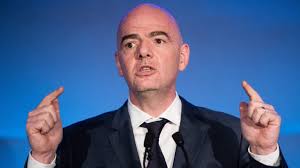By Andrew Warshaw
October 14 – It is full of detail about transparency and good governance but will it really restore public faith in an organisation brought to its knees by scandal and skullduggery?
Actions speak louder than words. While FIFA’s new roadmap for positive change entitled FIFA 2.0: The Vision for the Future – packaged to portray Gianni Infantino as a president who means business after undergoing serious media scrutiny since taking over from Sepp Blatter – looks impressive on paper, it is far too early to judge its effect.
FIFA has made so many mistakes before and since Infantino took over that it remains to be seen whether the comprehensive blueprint for the future of the organisation will really transform FIFA into the respected model of accountability that Infantino is so keen to bring about.
When he addressed members of the media at the end of the first day of FIFA’s first full Council meeting on Thursday, he certainly talked a good game.
“Reforms are worth nothing if they just end up being written in a nice booklet and nobody is applying them,” said Infantino. “We have transformed them into reality, concretely. We have been looking at where FIFA faced issues.”
Leading these issues is organisation of the World Cup and the related question of ticketing (see separate story). “We have to consider how can we do ticketing differently,” said Infantino, suggesting the end of FIFA’s relationship with long-time partner Match. “If we take more control over it then, at least, if there is somebody to be blamed then we can be blamed.”
Another key area of FIFA 2.0, which critics of Infantino might describe as no more than an attempt at self-promotion after a number of setbacks in the first eight months of his presidency, is a move to plough $4 billion into football development over the next decade and double the number of female footballers by 2026. Significantly given FIFA’s past misdemeanours, benefits for Council members will be cut including first-class travel and expenses for spouses.
Instituting stronger financial rules and “taking full control of all money flows”, as Infantino put it, have long been desperately needed. FIFA, he said, was building an organisation to “set the standards for others to follow”.
Easier said than done given the ongoing corruption scandal. Likewise the plan to honour Infantino’s election pledge to increase the amount awarded to each member association to $1.25 million over four years from the current $400,000.
“Our vision – to promote the game, protect its integrity and bring the game to all – will set the path forward for our work,” declared Infantino. “We will invest in the game, its players and its future; we will innovate to improve the player and fan experience; and we will take greater ownership of the business operations for our showcase events. This will enable us to deliver on our commitment to the game and its billions of fans. More work needs to be done as we make FIFA a stronger organisation and implement reforms approved by Congress, but we are proud of the achievements to date.”
FIFA 2.0, he added, was different to anything that has gone before under previous regimes. “It’s not words, it’s actions in terms of good governance, controls and transparency processes.”
Whilst no-one can question the rhetoric, the real issue is whether FIFA really can turn over a new leaf. Time will tell…
Contact the writer of this story at moc.l1745073039labto1745073039ofdlr1745073039owedi1745073039sni@w1745073039ahsra1745073039w.wer1745073039dna1745073039

